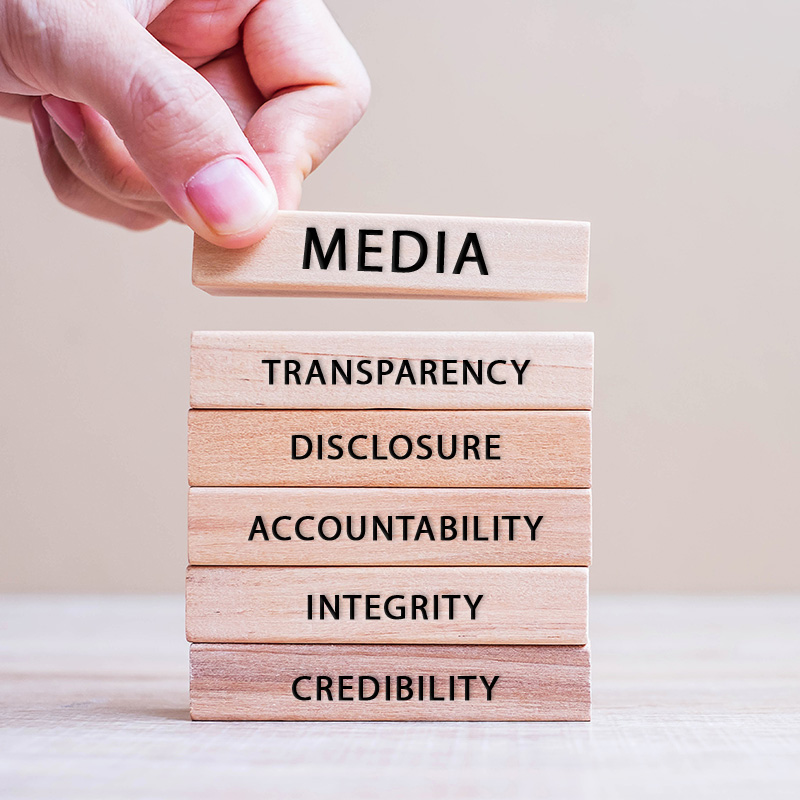The Importance of Disclosure and Transparency in Media
In today’s fast-paced digital era the principles of disclosure and transparency in social media have become paramount. Society depends on the media as a primary source of information, making it crucial for media organizations to uphold ethical standards and maintain the public’s trust. With the help of a Social Media Lawyer or an Influencer Lawyer experienced in the legal aspects of social media and influencer collaborations, media outlets and social media influencers can foster accountability, safeguard journalistic integrity, and ensure the dissemination of accurate and reliable information.
The Need for Disclosure and Transparency:

In an age of misinformation and fake news, disclosure and transparency play a vital role in distinguishing credible sources. By being open about their sources, conflicts of interest, and any potential biases, media organizations can establish trust with their audiences. This transparency allows individuals to make informed decisions and critically evaluate the information they consume.
Principles of Disclosure and Transparency:
- Source Attribution: Media outlets should clearly identify the sources of their information. This enables readers and viewers to assess the credibility and reliability of the content. Use anonymous sources sparingly and only when necessary, with appropriate justifications provided.
- Conflicts of Interest: Journalists and media organizations must disclose any potential conflicts of interest that could compromise the integrity of their reporting. This includes financial, personal, or professional relationships that may influence their objectivity.
- Editorial Independence: Media outlets should maintain autonomy from external influences, such as advertisers or political affiliations, to ensure unbiased reporting. Transparency regarding funding sources and ownership structures is essential to preserve editorial independence.
Accountability in Corporate Governance:
Transparency and disclosure are not limited to journalistic practices alone. In the realm of corporate governance, these principles are equally crucial. Media organizations need to ensure accountability by providing visibility into their decision-making processes, financial operations, and internal policies. This transparency extends to the treatment of employees, adherence to ethical guidelines, and commitment to diversity and inclusion.
Information That Should be Disclosed:
- Funding and Sponsorship: Media organizations should disclose any financial support or sponsorship that may influence their content. This includes explicit identification of advertisers, sponsors, or funders, minimizing the risk of biased reporting.
- Corrections and Retractions: Media outlets should promptly acknowledge and rectify errors, when they occur. Transparently communicating such mistakes helps maintain credibility and trust with the audience.
- Data Collection and Privacy Practices: As media outlets increasingly collect user data, it is essential to disclose their data collection practices, storage methods, and how they safeguard user privacy. Transparency in this area ensures users’ informed consent and protects their personal information.
Examples of Disclosure and Transparency in Media:
- Nonprofit News Organizations: Entities such as ProPublica and the Center for Public Integrity exemplify transparency by publishing detailed reports on their funding sources, organizational structure, and journalistic methodologies.
- Fact-Checking Initiatives: Media outlets that integrate fact-checking departments, such as PolitiFact and Snopes, demonstrate transparency by openly documenting their fact-checking processes and sources.
- Financial Disclosures: In investigative journalism, publications like The Guardian’s Panama Papers coverage or the International Consortium of Investigative Journalists (ICIJ) demonstrate the importance of disclosing financial information, exposing corruption and holding power to account.
- In the era of social media, the rise of digital influencers has added a new dimension. Social media influencers collaborating with brands and promoting products have a responsibility to practice disclosure and transparency to maintain credibility and foster trust among their audience. Read more about the terms that should be in a social media influencer agreement.
Disclosure and transparency are vital cornerstones of a responsible and trustworthy media ecosystem. By adhering to these principles, media organizations can strengthen accountability, maintain public trust, and combat the spread of misinformation. The commitment to disclosure and transparency empowers individuals to make informed decisions, ultimately fostering a well-informed and democratic society.
** This post is for informational purposes only. For legal advice in navigating the complexities of social media and influencer matters, contact a Social Media Influencer Lawyer in New York or call (212) 688-8944. **

